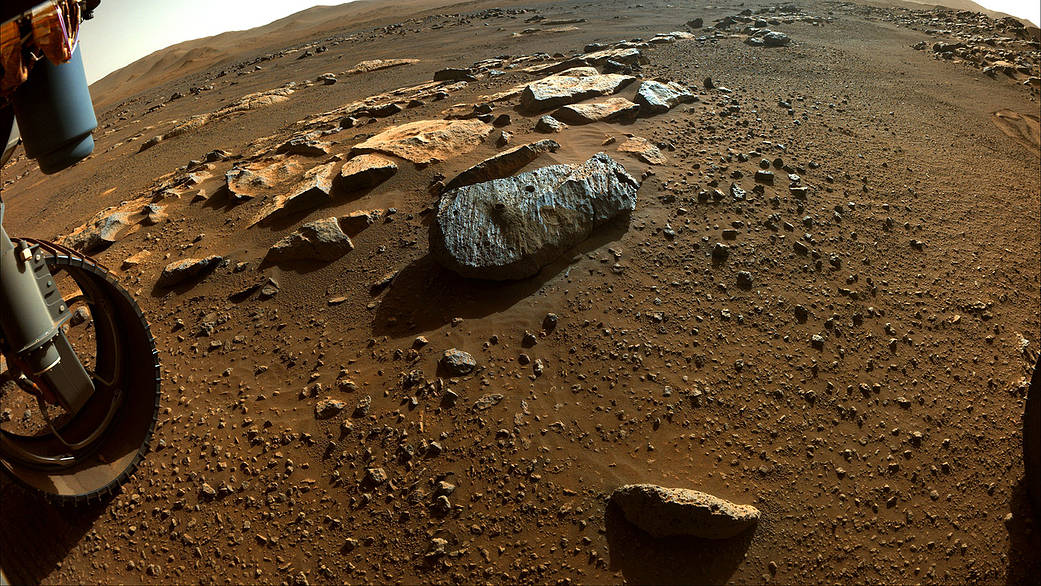Researchers turn Martian air, dirt and sunlight into iron

Swinburne researchers are working on a metallurgical process that will make off-world building easier. Image credit: NASA
In summary
- Producing resources on other planets allows for more efficient, cheaper and more sustainable development in space
- This allows for greater human exploration and technology, like satellites, that help gather data and solve problems back on Earth
- Living on an alien world won’t be easy, but we now know how we could make structures for future missions to the Red Planet
A team of researchers, led by Swinburne’s Professor Akbar Rhamdhani, has published the first detailed study of its kind on metal production on another planet.
The team are focused on metal extraction on Mars. They are developing a process that would take processed air, dirt and sunlight on Mars to create metallic iron. It uses concentrated solar energy as a heat source and carbon, which is produced by the cooling of CO gas – which is a by-product of oxygen production in the Mars atmosphere.
This oxygen production has been demonstrated on Mars, on the Perseverance rover, through the MOXIE (Mars Oxygen In-Situ Resource Utilisation Experiment) NASA project. Hence, Swinburne’s metal extraction process is intended to be coupled with a future oxygen generator plant (one that is much larger than MOXIE) to co-produce oxygen and iron alloy, which can be used to create metals. This can then be used to further human missions and development on Mars.
Swinburne Director of the Space Technology and Industry Institute, Professor Alan Duffy, says, “This work brings together the very latest experience from industry and fundamental cccing expertise across the university to make clear how we might produce off-world building materials from Mars itself.
“It shows that living on an alien world won’t be easy, but we now know how we might be able to make the structures for future missions to the Red Planet.”

The Swinburne team used a solar simulator or furnace to simulate concentrated solar energy as a heat source
Why do we need metals on other planets?
Launching technology into space is expensive, time-consuming and bad for the environment. Producing resources on other planets allows for great, more efficient, cheaper and more sustainable development in space.
This allows for greater human exploration and technology, like satellites, that help gather data and solve problems back on Earth.
Professor Akbar Rhamdhani says, “We would like to develop a metal extraction process on Mars that is truly utilising in-situ resources – without bringing reactants from Earth – to support further human mission and development on Mars.”
“If you wanted to build something large on Mars without having to pay to launch everything from Earth (think large satellites, mars colonies, refuelling depots and more), this could be a very valuable process.”
Next steps
The team – postdoctoral researcher Dr Reiza Mukhlis and PhD students Deddy Nababan, Matthew Shaw and Matthew Humbert from Swinburne’s Fluid and Process Dynamics Research Group and Space Technology and Industry Institute – are currently working closely with CSIRO Minerals and the CSIRO Space Technology Future Science Platform to take the research to the next stage.
-
Media Enquiries
Related articles
-

- Technology
- Science
- Engineering
Victorian students drive green energy transition through international hydrogen competition
Swinburne’s KIOSC, in collaboration with Horizon Educational and Gippsland Tech School, co-hosted the Hydrogen Grand Prix in Melbourne.Friday 26 July 2024 -

- Technology
- Health
New MedTechVic prototypes to transform everyday lives of people with a disability
Swinburne’s MedTechVic has revealed three new prototypes designed through the joint Health-led Manufacturing Innovation Program, in partnership with the Australian Medtech Manufacturing Centre and Safer Care Victoria
Friday 19 July 2024 -

- Science
Skin, scales and fish tails: using collagen to turn fish guts into gold
New research from Swinburne could transform the sector by converting high value collagen proteins from seafood by-products into cosmetics, food, and pharmaceuticals.
Tuesday 02 July 2024 -

- Education
- Engineering
Transforming the lives of refugee engineers through the EPIC Program
Swinburne has been partnering with the Level Crossing Removal Project (LXRP) on the Engineering Pathway Industry Cadetship (EPIC) program, helping refugee engineers gain international qualifications for the Australian workforce through an 18-month paid cadetship program.
Thursday 20 June 2024 -

- Science
- Engineering
Submarines in the future could self-identify cracks and self-heal thanks to Swinburne researcher
Thanks to the work of Dr Nisa Salim from Swinburne University of Technology’s School of Engineering, future submarines could self-identify microcracks and self-heal using a new kind of carbon fibre reinforced polymer composites.
Monday 17 June 2024

